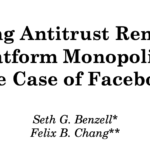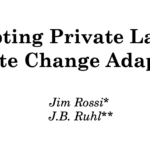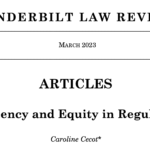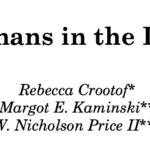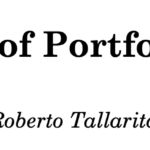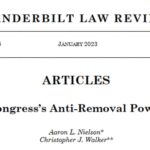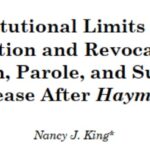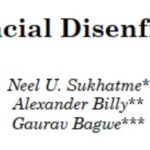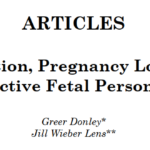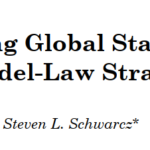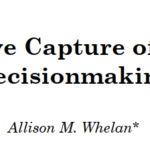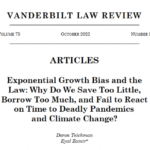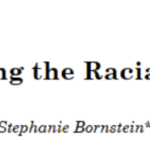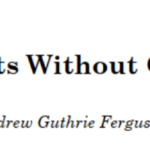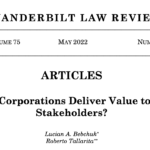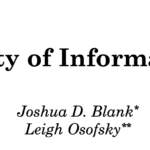Articles Category
Evaluating Antitrust Remedies for Platform Monopolies: The Case of Facebook
Apr. 26, 2023—Seth G. Benzell & Felix B. Chang | 76 Vand. L. Rev. 773 This Article advances a framework to assess antitrust remedies and policy interventions for platform monopolies. As prosecutors and regulators barrel forward against digital platforms, soon it will fall upon courts and administrative agencies to devise remedies. We argue that any sensible solution...
Adapting Private Law for Climate Change Adaptation
Apr. 26, 2023—Jim Rossi & J.B. Ruhl | 76 Vand. L. Rev. 827 | The private law of torts, property, and contracts will and should play an important role in resolving disputes regarding how private individuals and entities respond to and manage the harms of climate change that cannot be avoided through mitigation (known in climate change...
Efficiency and Equity in Regulation
Mar. 28, 2023—Caroline Cecot | 76 Vand. L. Rev. 361 The Biden Administration has signaled an interest in ensuring that regulations appropriately benefit vulnerable and disadvantaged communities. Prior presidential administrations since at least the Reagan Administration have focused on ensuring that regulations are efficient, maximizing the net benefits to society as a whole, without considering who benefits...
Humans in the Loop
Mar. 28, 2023—Rebecca Crootof, Margot E. Kaminski & W. Nicholson Price II | 76 Vand. L. Rev. 429 From lethal drones to cancer diagnostics, humans are increasingly working with complex and artificially intelligent algorithms to make decisions which affect human lives, raising questions about how best to regulate these “human-in-the-loop” systems. We make four contributions to the...
The Limits of Portfolio Primacy
Mar. 28, 2023—Roberto Tallarita | 76 Vand. L. Rev. 511 According to the “portfolio primacy” theory, large asset managers, and in particular large index funds, can and will undertake the role of “climate stewards” and will push corporations to reduce their carbon footprint. This theory is based on the view that index fund portfolios mirror the entire...
Congress’s Anti-Removal Power
Jan. 27, 2023—Aaron L. Nielson & Christopher J. Walker | 76 Vand. L. Rev. 1 Statutory restrictions on presidential removal of agency leadership enable agencies to act independently from the White House. Yet since 2020, the U.S. Supreme Court has held two times that such restrictions are unconstitutional precisely because they prevent the President from controlling policymaking...
Constitutional Limits on the Imposition and Revocation of Probation, Parole, and Supervised Release After Haymond
Jan. 27, 2023—Nancy J. King | 76 Vand. L. Rev. 83 In its Apprendi line of cases, the Supreme Court has held that any fact found at sentencing (other than prior conviction) that aggravates the punishment range otherwise authorized by the conviction is an “element” that must be proved beyond a reasonable doubt to a jury. Whether...
Felony Financial Disenfranchisement
Jan. 27, 2023—Neel U. Sukhatme, Alexander Billy & Gaurav Bagwe | 76 Vand. L. Rev. 143 Individuals with prior felony convictions often must complete all terms of their sentence before they regain voter eligibility. Many jurisdictions include legal-financial obligations (“LFOs”)—fines, fees, and/or restitution stemming from convictions—in the terms of the sentence. Twenty-eight states, governing over 182 million...
Abortion, Pregnancy Loss, & Subjective Fetal Personhood
Nov. 22, 2022—Greer Donley & Jill Wieber Lens | 75 Vand. L. Rev. 1649 Long-standing dogma dictates that recognizing pregnancy loss threatens abortion rights—acknowledging that miscarriage and stillbirth involve the loss of something valuable, the theory goes, creates a slippery slope to fetal personhood. For decades, antiabortion advocates have capitalized on this tension and weaponized the grief...
Regulating Global Stablecoins: A Model-Law Strategy
Nov. 22, 2022—Steven L. Schwarcz | 75 Vand. L. Rev. 1729 Digital currencies have the potential to improve the speed and efficiency of the payment system. The principal challenge is retail: to facilitate day-to-day payments among consumers as an alternative to cash, both domestically and across national borders. Two models of digital currencies are becoming viable: central...
Executive Capture of Agency Decisionmaking
Nov. 22, 2022—Allison M. Whelan | 75 Vand. L. Rev. 1787 The scientific credibility of the administrative state is under siege in the United States, risking distressful public health harms and even deaths. This Article addresses one component of this attack—executive interference in agency scientific decisionmaking. It offers a new conceptual framework, “internal agency capture,” and policy...
Exponential Growth Bias and the Law: Why Do We Save Too Little, Borrow Too Much, and Fail to React on Time to Deadly Pandemics and Climate Change?
Oct. 20, 2022—Doron Teichman & Eyal Zamir | 75 Vand. L. Rev. 1345 Many human decisions, ranging from the taking of loans with compound interest to fighting deadly pandemics, involve phenomena that entail exponential growth. Yet a wide and robust body of empirical studies demonstrates that people systematically underestimate exponential growth. This phenomenon, dubbed the exponential growth...
Confronting the Racial Pay Gap
Oct. 20, 2022—Stephanie Bornstein | 75 Vand. L. Rev. 1401 For several decades, a small body of legal scholarship has addressed the gender pay gap, which compares the median full-time earnings of women and men. More recently, legal scholars have begun to address the racial wealth gap, which measures racial disparities in family economic security and wealth...
Courts Without Court
Oct. 20, 2022—Andrew Guthrie Ferguson | 75 Vand. L. Rev. 1461 What role does the physical courthouse play in the administration of criminal justice? This Article uses recent experiments with virtual courts to reimagine a future without criminal courthouses at the center. The key insight of this Article is to reveal how integral physical courts are to...
Will Corporations Deliver Value to All Stakeholders?
May. 18, 2022—Lucian A. Bebchuk & Roberto Tallarita | 75 Vand. L. Rev. 1031 (2022) | Amid growing concerns for the effects that corporations have on stakeholders, supporters of stakeholder governance advocate relying on corporate leaders to use their discretion to protect stakeholders, and they seem to take corporate pledges to do so at face value. By contrast, critics...
The Inequity of Informal Guidance
May. 18, 2022—Joshua D. Blank & Leigh Osofsky | 75 Vand. L. Rev. 1093 (2022) | The coexistence of formal and informal law is a hallmark feature of the U.S. tax system. Congress and the Treasury enact formal law, such as statutes and regulations, while the Internal Revenue Service offers the public informal explanations and summaries, such as...
